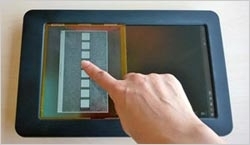 The ability to
bring sensory experiences to the mobile screen just might change the way consumers purchase goods and services online. Devices could one day simulate sticky and smooth sensations through
electrovibrationby altering the voltage levels on glass surfaces that change the friction between the fingertip and the screen.
The ability to
bring sensory experiences to the mobile screen just might change the way consumers purchase goods and services online. Devices could one day simulate sticky and smooth sensations through
electrovibrationby altering the voltage levels on glass surfaces that change the friction between the fingertip and the screen.
Researcher Hong Tan, based at Microsoft Research in Asia, demonstrates an electrostatic haptics
prototype device on which the gray area feels rough, like sandpaper, and the dotted line has a notched texture for scrolling. Today "we touch the screen with a numb hand and cannot feel anything but a
piece of cold glass," she said. Tan describes technology from Microsoft that creates human computer interaction enabling users not only to touch, but to feel what's on the computer screen.
In
the mid 2000s as Sony began to develop 4k digital projection systems -- the same chips now in televisions -- the entertainment industry set out to create in-home entertainment systems with sensory
experiences. Moviemakers wanted the earth to shake and the air smell musty when dinosaurs walked across the screen or the light in the room dim or flicker when the twister touched down in the movie
Twister. The sensory awareness would enhance the movie experience in the home living room.
Touchscreens were step one. Sensory experiences will follow. But by the time we see this on mobile
devices, artificial intelligence technology from companies like Viv Labs -- along with the next version of Google Now, Microsoft Cortana, and Apple Siri -- will be well on its way to change online advertising and targeting based on the technology's ability to
learn, aggregate and process data from the phone and across the Web. One clue comes from the description of Viv on the company's Web site: Viv is taught by the world, knows more than it is taught, and
learns every day.
Tan has been working on sensory experiences for more than 20 years. In 2001, she and coauthor Alex Pentland published a book chapter on "Tactual Displays for Sensory
Substitution and Wearable Computers."